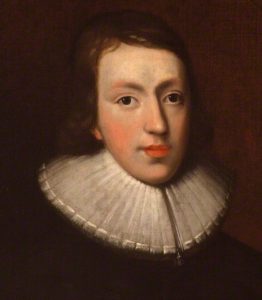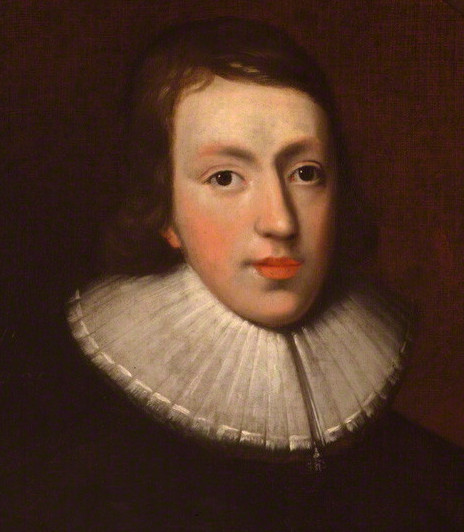In this first of a projected two-volume work, Nicholas McDowell (Univ. of Exeter) offers “a biography of the mind” of the young Milton, “before he became renowned as the writer of the greatest narrative poem in English,” Paradise Lost. McDowell, as coeditor of The Oxford Handbook of Milton, is already an established Milton scholar.
As such he is well aware of the traps into which previous Milton scholars have fallen in trying to explain Milton’s rise from a minor poet to one of the foremost exponents of the murder of King Charles I. McDowell lands on the following eyrie from which to view his subject: “Milton’s life must always finally be written as a literary or critical biography, but his poetic development can be approached from the perspective of the education, the reading, the society, and the intellectual experiences which shaped his mind…My method more resembles that of intellectual biography than traditional literary or personal biography.”
By doing so he effectively dismisses much modern scholarship. He divines “a consistency can be found in Milton’s religious and political development between the 1620s and 1640s.” In this he pushes back against those who ground their arguments in theological disputes. Rather, McDowell looks at the educational, cultural and literary principles he came into contact with, which led to his “fascination with Platonic perfectionism and ideas of the daemonic.” By daemonic, it appears Milton was inspired by a winged soul, intermediate between Man and God, “empowered to convey divine knowledge from the heavenly to the earthly realm.” Milton achieved a fusion of these Platonic and daemonic ideas with Ciceronian ideas of the ideal orator. The result “is a conception of the truly learned individual as one who can realise an insight into the nature of things in the manner of the ancient heroes.”
The author admits that fully understanding the mind of Milton is particularly difficult for modern readers. For example: the mindset of the school Milton went to, St. Paul’s. “Erasmian principles imbued the ethos of St. Paul’s school,” he writes. Without a grounding in sixteenth century Humanities, few people today would even know what that means. But Milton “would have deemed the display of his capacity at an early age to master the ‘pure chaste eloquence’ of classical Latin as a youthful assertion not only of his humanist civility but of his Christian morality.” Milton also regarded Italian, especially the works of Dante, “as exemplifying the level to which English poets should aspire.” His early friendship with the Italian Charles Diodati, who married an English woman, is a constant throughout the book. Diodati was not just a friend, the author posits, but the only one who could bring Milton down to earth. “One wonders if, with Diodati’s early death in 1638, Milton lost the one person whom he would allow to get away with pricking the bombast of his intellectual and literary pretensions.” Scholars have tended to downplay Milton’s other friendship, the one with the Court musician Henry Lawes. The reason for doing so does not shine a favourable light on modern scholarship. It is due, writes the author, because “it fits uneasily with the notion of a revolutionary in the making.” The main strength of this book is as a corrective to the mass of ill-considered Milton scholarship that tries to fit his formative years into a convenient narrative.
The author identifies the twin pursuits of eloquence and erudition as the animating principles for the young Milton of the 1620s and 1630s (he was born in 1608). He aimed at being a universal scholar, which became known by the 1570s as polyhistor, and while McDowell does mention astronomy in passing, he does not explore the influence it had on him. For example, Milton’s view of the comet of 1618, when he was only ten, found its way into Paradise Lost. Of course, that era of Milton’s life is for McDowell’s upcoming book, but a mention in this book of his early life would have laid the groundwork.
Several points are made in this text that might startle or perplex readers who are not 17th century experts. For one, Milton rightly “equated the decline of learning in English society with the dominance of the Roman Catholic Church…Milton took evident enjoyment in stretching English prose to its limits to abuse the bishops, and he seems to be trying to embody in prose the grotesque imagery of clerical greed and its punishment in Dante.” This refers to a visit Dante paid to the fourth circle of Hell, where he witnessed cardinals and popes condemned to rolling stones over and over without end!!!
However, the worm turned when Presbyterians “to his horror, turned their charge of heresy on his own writings on divorce.” So by 1644, Milton turned the same language he used in his anti-Catholic polemics against Protestants! This is one of the many theological conundrums that bedevil scholars trying to make sense of the turbulent mid-17th century. McDowell is able to navigate these dangerous shoals, which is a prime reason this book is so important.
McDowell encapsulates the thrust of his book in the epilogue, where he states “we do not need to place Milton in a ‘radical underground’ to explain how he came to hold his radical beliefs.” One looks forward to this book’s sequel to understand how this radicalisation made him at the same time a thoroughly loathsome individual and our greatest epic poet.
The text is marred by 4 typos: “by by” should be “by” on pg. 14; “over over” should be “over” on pg 71; “to chose to” should be “chose to” on pg 158; “in letter” should be “in a letter” on pg 269.
Poet of Revolution: The Making of Milton is $35 by Princeton University Press

